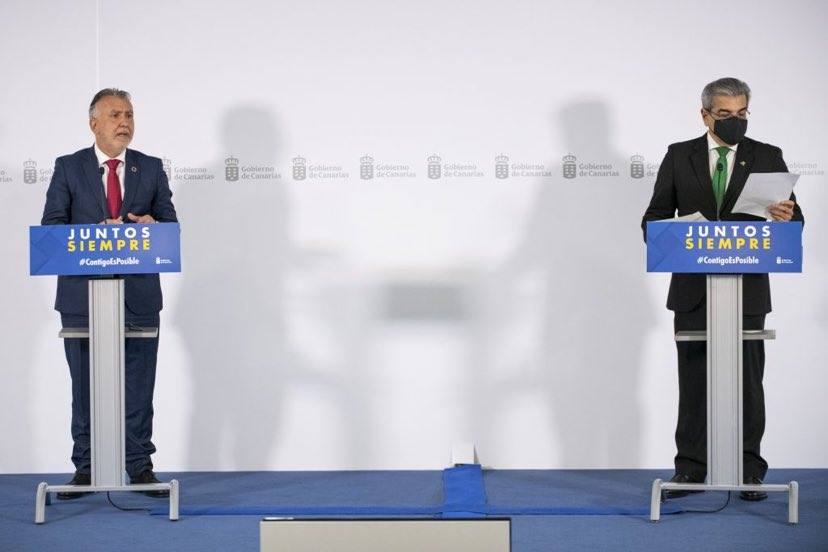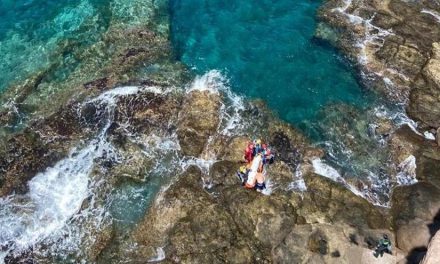The President of the Canary Islands, Ángel Víctor Torres, and the vice president, Román Rodríguez, presented last week the regional support plan of extraordinary measures to help the sub-sectors of restaurants, bars, hospitality, commerce and sports companies most affected due to the consequences of the COVID-19 pandemic and the health restrictions applied in response. The new program of measures contemplates a total of €400 million, in addition to the €95.3 million in direct contributions distributed since March 2020 by the regional Executive for air and maritime transport, the agricultural sector, the self-employed, culture and other productive areas.
This is the highest budget extraordinary support plan presented by any Spanish autonomous community for those most affected sub-sectors, taking into account the state average and the economic capacity of the Canary Islands. €165m is aimed at direct non-refundable aid, based on the effects of the pandemic on the different businesses. To administrate this, an application call will be opened, with a goal of maximum speed, objectivity and effectiveness, in compliance with current regulations. In any case, the Executive is convinced that this package of direct aid will be in place during this first quarter of 2021.
The other €235.8m corresponds to the postponement of the Canarian General Indirect Tax (IGIC) of the first quarter of 2021 (a total of €195m) and tax debts for six months, which is expected to be approved in the Governing Council this Thursday, entering into force from its publication in the Official Gazette of the Canary Islands (BOC). The collection of IGIC corresponding to April will be delayed until September and, to compensate it, the Government will resort to a credit policy, although without ceasing to contribute what corresponds to municipal councils and city councils for that period so that they do not fall into default.
The regional president highlighted the relevance of this program of measures and those already processed by the Canary Islands during 2020. As indicated, they will complement those included in the decree of the last Council of Ministers in 2020 and will alleviate the effects of the restrictions on all the islands, regardless of the alert level that they have had during each phase. “This is the most important economic proposal that has been made by any community, which is also the most affected in [terms of] tourism, restaurants and commerce” Torres pointed out.
The regional Executive wants the €165m in direct aid to come from the React-EU European recovery funds. For this, explained Román Rodríguez, it has been proposed to the central government that they, in turn, propose to the EU a restructuring of how part of these community resources are to be used. The final proposal will be presented before the 31st of this month and the Government hopes that it will be approved. Otherwise, another extraordinary loan will be used to cover that €165m.
The Canary Islands Government highlighted state aid measures, such as the flexibility of grace periods for ICO credits or the extension of ERTES until May 31. In this sense, they emphasised that aid has covered €4 billion in credits throughout 2020 and €1.5b in ERTE payments across the Islands. However, they feel that it should be complemented with an extra package that does not affect the €8.5b of regional budget for 2021 which can be expanded through contributions from each Cabildo within their budgetary items for this new year. Regional accounts this year prioritise basic rights and add a further €646m for Health and Education, which has allowed the hiring of some 7,000 professionals.
Agile and objective support plan procedures for hotels and apartments
The support plan also contemplates that this aid be complemented by municipal councils and city councils, as they are the ones who manage compensation of collections such as the Real Estate Tax ( IBI), for which it is still necessary to negotiate. The regional executive understands that the IBI is a good way to help because it is an objective receipt and easy to verify and process, apart from the collection of local taxes such as garbage and others. Torres also indicated that it is being considered how they might streamline the management of aid with the support of the chambers of commerce in order to achieve maximum certainty and tranquility for entrepreneurs.
The president and vice president said that they have worked with the various sectors with the aim to reach the most objective and agile ways for direct aid to arrive as quickly as possible “because we know that we must be with the sectors that have been most affected”. “In absolute and relative values, this support plan is above all other communities, despite the fact that some of them have been more damaged by health restrictions, but the islands require it to alleviate the worst crisis in our history,” said Rodríguez.
Torres pointed out that help is planned for “more than 20,000 companies, including 5,423 restaurants, 1,300 cafeterias and 348 sports facilities.” The president thanked the representatives of the affected sub-sectors and, like Rodríguez, insisted that the key continues to be to control of the pandemic with compliance with regulations and vaccination. They highlighted the rhythm of administration of the doses on the Islands, which has made the Archipelago a leader among the regions of Spain in percentage terms, with achievements such as Tenerife and La Gomera being the only places in the country that have reduced infection contacts over Christmas after the restrictions put in place.
The president insisted that they have never wanted to close any business, but that the established and assessed rules are applied, so he conceives this extraordinary aid plan as “a relief” and predicts that, thanks to the vaccination, “things will get better”.













